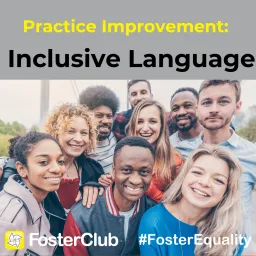Some agencies and organizations are encouraging the use of inclusive language in their spaces. But what is inclusive language and how do you use it? Keep reading to find out!
What is Inclusive Language? Language that avoids certain expressions or words that exclude a particular group of people. Inclusive Language is meant to be inclusive to all aspects of a person’s identity. However, given that we’re talking about queer youth in care, we’re going to focus on gendered language in this blog.
Why should I use it?
Simply put: It helps queer youth in care!
Queer youth in care hear and see a lot of negative messaging about their sexual orientation and gender identity. Inclusive language can help signal to queer youth in care that you’re an ally and are a support regardless of how they identify
It can help queer youth in care feel safe to be their authentic selves to hear those around them using inclusive language
When queer youth are able to be their authentic selves, it serve as a protective factor against adverse mental health
How do I use it?
Work to avoid gendered language when you talk and write
Use people’s preferred name and pronouns (don’t know someone’s preferred name and pronouns? You can always ask! Make sure to share your pronouns as well)
Practice, practice, practice. You’ll make some mistakes, and that’s okay! Just keep trying
To help you get started: Here are some examples of common gendered word/phrases, some inclusive language alternatives, and why the change matters to help you get started:
Want to learn more about how to use inclusive language? Check out this resource: Inclusive Language Guidelines


